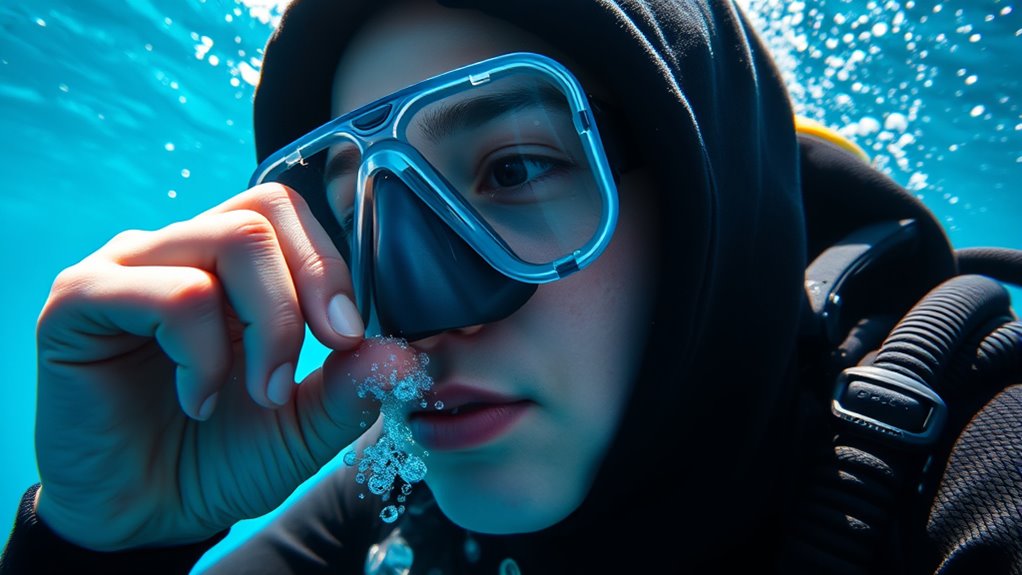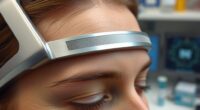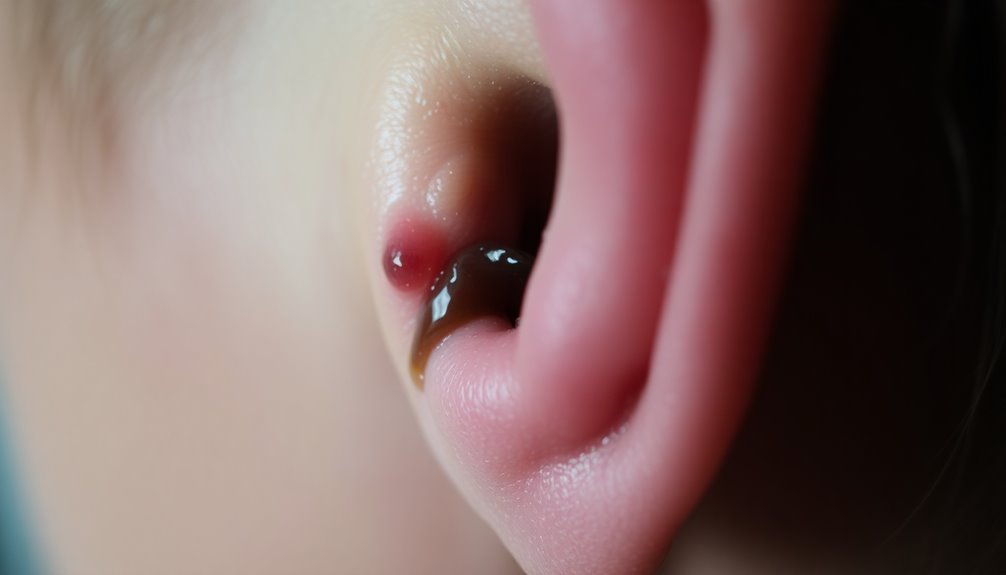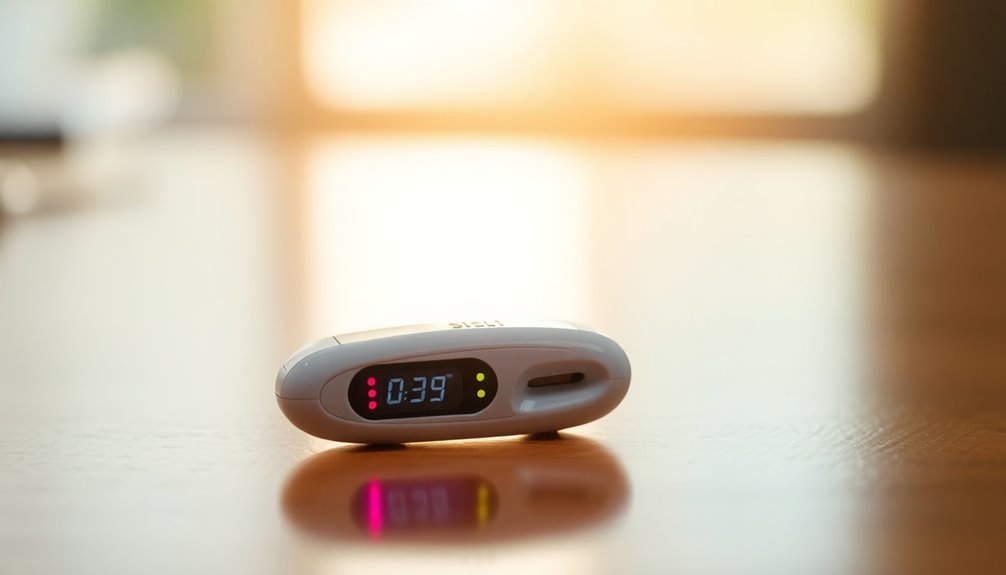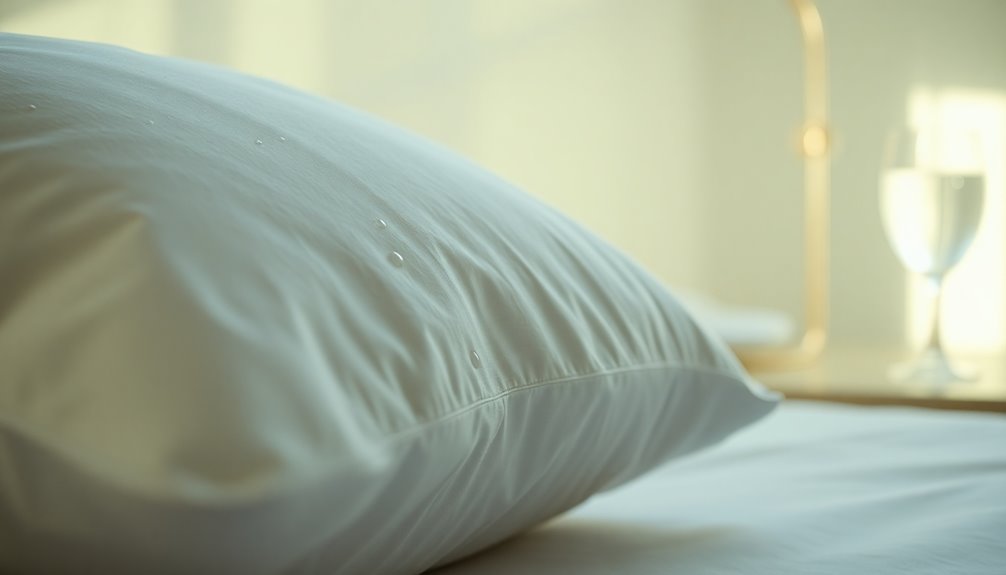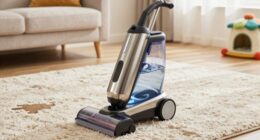To avoid ear barotrauma while flying or diving, you need to equalize ear pressure regularly. Use techniques like the Valsalva or Toynbee maneuvers during altitude or depth changes, and stay hydrated to keep your Eustachian tubes clear. Avoid flying or diving when congested and consider using decongestant sprays beforehand. If you experience persistent pain, hearing loss, or dizziness, seek medical help right away. Keep these tips in mind to protect your ears effectively.
Key Takeaways
- Use techniques like Valsalva or swallowing to equalize ear pressure during altitude or depth changes.
- Stay well-hydrated and avoid alcohol or caffeine to keep mucus membranes flexible and reduce congestion risk.
- Prepare your ears with nasal sprays or decongestants before travel if you’re congested.
- Recognize symptoms such as persistent pain, hearing loss, or dizziness and seek medical help if they occur.
- Use ear plugs and avoid travel when experiencing nasal congestion or illness to minimize barotrauma risk.
Understanding Ear Barotrauma and Its Causes
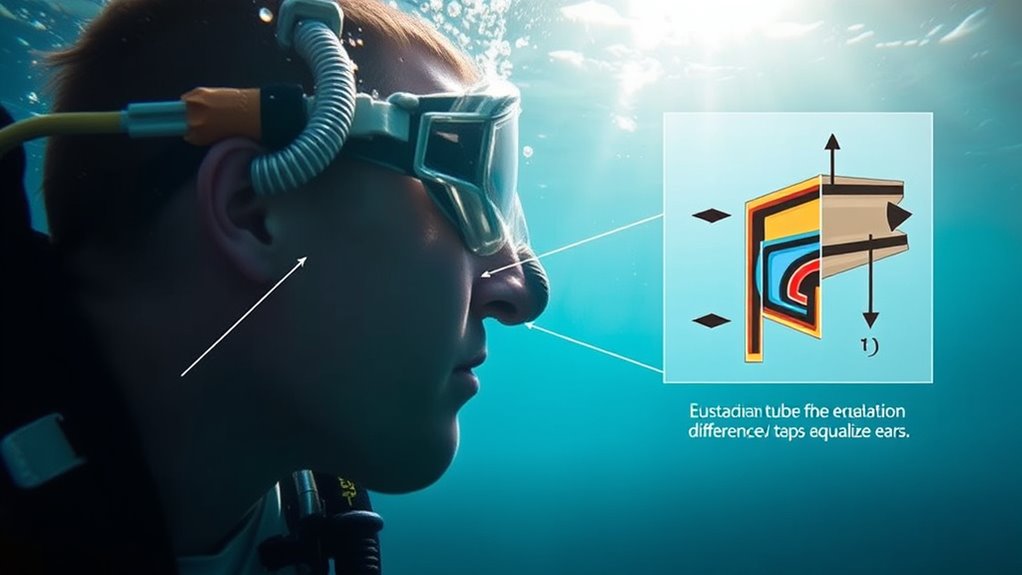
Ear barotrauma occurs when there’s a pressure imbalance between the middle ear and the environment, often caused by rapid changes in altitude or depth. When you ascend or descend quickly, your Eustachian tube struggles to equalize pressure. This can lead to a feeling of fullness, discomfort, or pain. If the pressure isn’t balanced, the eardrum may become stretched or even rupture in severe cases. Factors like congestion, allergies, or infections can make it harder for your ears to adjust, increasing the risk. Understanding these causes helps you recognize why your ears might hurt during flying or diving. The key is to be aware of how pressure changes impact your ears and take steps to manage those changes effectively. Proper equalization techniques can significantly reduce the risk of injury during altitude or depth changes.
Preparing Your Ears Before Flying and Diving
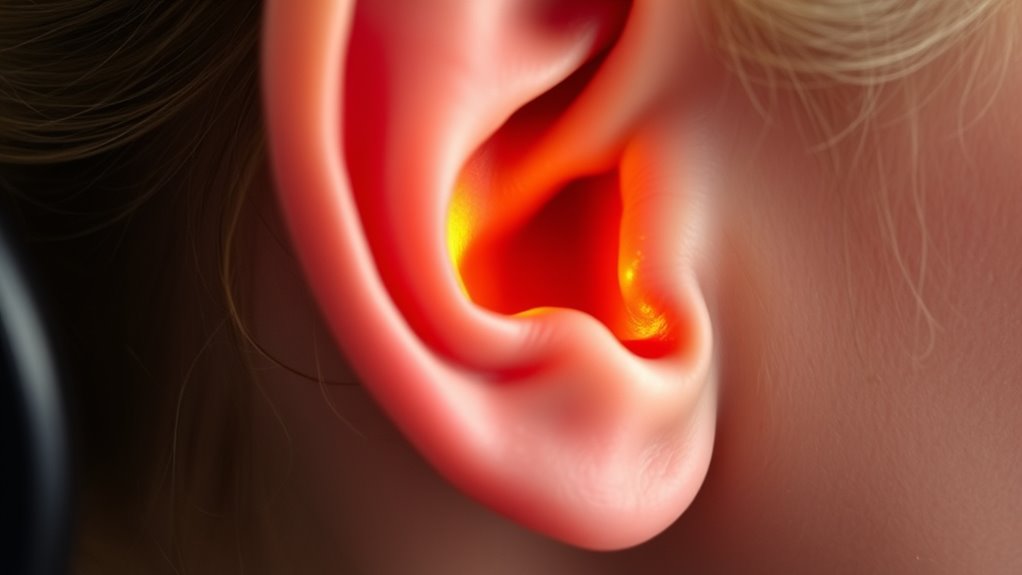
To minimize the risk of barotrauma during flying or diving, taking steps to prepare your ears beforehand makes a significant difference. Proper preparation helps ensure your ears can handle pressure changes more comfortably. You can start by staying well-hydrated, as this keeps your mucus membranes moist and flexible. Using a nasal spray or decongestant before your trip can help clear your Eustachian tubes, reducing blockage. Additionally, chewing gum or swallowing frequently during ascent or descent encourages jaw movements that promote ear equalization. Remember, avoiding alcohol and caffeine can also reduce nasal congestion. Being aware of the importance of color accuracy in visual presentation can help you better understand how to optimize your environment for clear and comfortable hearing experiences. These simple measures help your ears adapt smoothly to pressure changes, decreasing the likelihood of pain or injury during your flight or dive.
Techniques to Equalize Ear Pressure Effectively
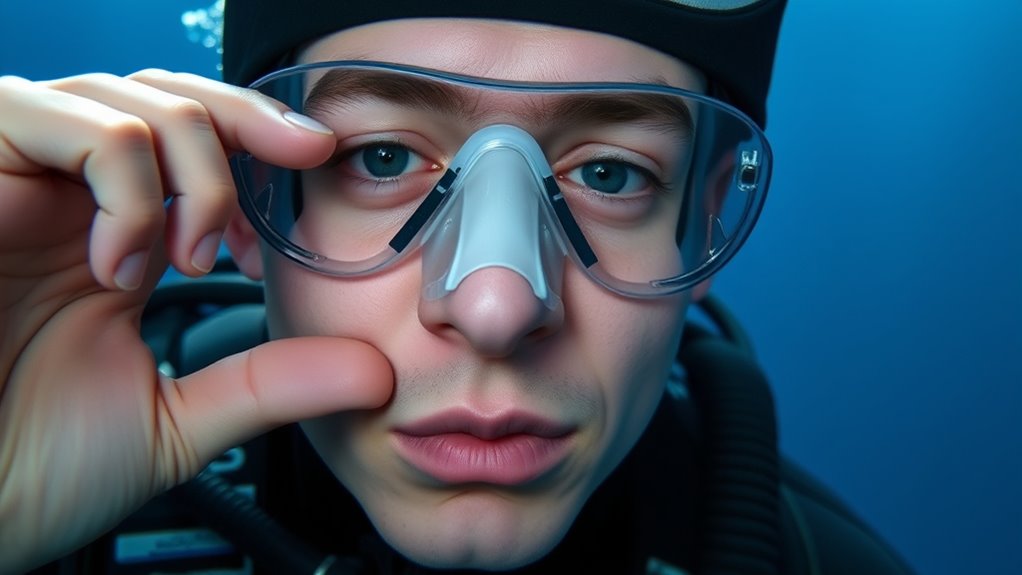
Effective techniques for equalizing ear pressure require active engagement and practice. One common method is the Valsalva maneuver: gently pinch your nose, close your mouth, and blow softly through your nose. This action helps open the Eustachian tubes, balancing pressure. Alternatively, the Toynbee maneuver involves swallowing while pinching your nose, which also encourages tube opening. Yawning or chewing gum can stimulate natural swallowing, aiding pressure equalization. Some find that performing these techniques periodically during ascent or descent prevents discomfort. Remember, don’t force any method if you experience pain or resistance. Take slow, deliberate actions, and stop if you feel discomfort. Practicing these techniques before your trip will help you react quickly and comfortably when needed. Regularly monitoring air quality can also assist in avoiding environments that exacerbate ear discomfort during travel.
Recognizing Symptoms and When to Seek Medical Help
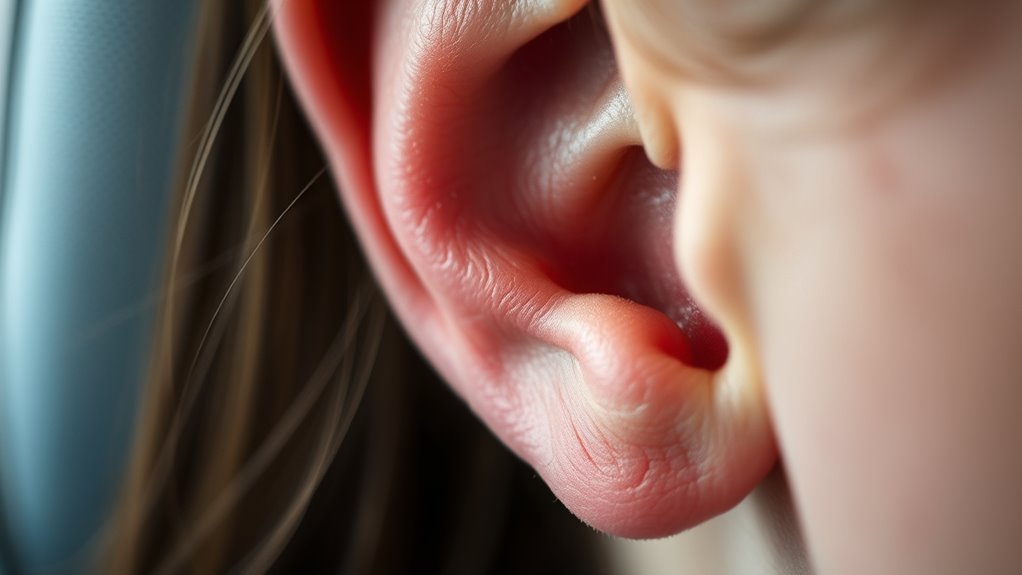
Recognizing symptoms of ear barotrauma is essential to prevent complications. If you notice any of these signs, it’s time to seek medical help promptly:
Recognizing ear barotrauma symptoms promptly can help prevent serious complications and ensure timely treatment.
- Persistent ear pain or pressure that doesn’t improve
- Sudden hearing loss or muffled sounds
- Dizziness, vertigo, or balance issues
Other warning signs include ringing in the ears (tinnitus) or fluid drainage from the ear. If symptoms worsen or don’t resolve after attempts to equalize pressure, don’t delay consulting a healthcare professional. Early intervention can prevent more serious damage, such as eardrum rupture or infection. Trust your instincts—if you feel something is seriously wrong, seek medical attention immediately to protect your ear health and avoid long-term issues. Incorporating professional voiceover techniques can also help in effectively communicating safety tips.
Additional Tips for Protecting Your Ears During Travel

Traveling by plane, dive boat, or at high altitude can put your ears at risk of barotrauma, but you can take simple steps to protect them. First, swallow, yawn, or chew gum during ascent and descent to help equalize pressure. Using a decongestant spray before travel can reduce nasal swelling, easing pressure equalization. Avoid flying or diving when you’re congested to prevent complications. Here’s a quick reference:
| Tip | When to Use | Benefit |
|---|---|---|
| Swallow, Yawn, or Chew | During altitude changes | Opens Eustachian tubes |
| Decongestant Spray | Before travel, when congested | Reduces nasal swelling |
| Avoid Travel When Sick | When feeling ill | Prevents pressure buildup |
| Stay Hydrated | Throughout travel | Keeps mucous membranes moist |
| Use Ear Plugs | During descent and ascent | Regulates pressure changes |
Frequently Asked Questions
Can Children Safely Fly or Dive Without Risking Ear Barotrauma?
You’re asking if children can safely fly or dive without risking ear barotrauma. While children’s ears are more flexible, they still face risks from pressure changes. To keep them safe, guarantee they swallow, yawn, or chew gum during ascent or descent, and consult a doctor if they have cold or sinus issues. Proper precautions help minimize discomfort and prevent injury during these activities.
Are There Specific Types of Ear Plugs Recommended for Diving or Flying?
Imagine your ears as delicate valves that open and close like tiny gates. For flying or diving, you want earplugs that act as reliable shields, gently controlling pressure changes. Look for high-quality, moldable or semi-insert earplugs designed for water or air pressure. These help prevent barotrauma by moderating pressure shifts, giving your ears a steady gatekeeper. Always choose earplugs approved for your activity, and follow usage instructions carefully.
How Can I Prevent Ear Barotrauma if I Have a Cold or Allergies?
When you have a cold or allergies, you should avoid flying or diving to prevent ear barotrauma. If you must go, take decongestants or antihistamines beforehand to reduce nasal congestion. Use nasal sprays or steam inhalation to clear your sinuses. Chew gum or perform the Valsalva maneuver during ascent or descent to help equalize ear pressure. If you experience pain, stop and seek medical advice before continuing.
What Are the Long-Term Effects of Repeated Ear Barotrauma?
Did you know that repeated ear barotrauma can lead to chronic hearing issues in up to 30% of cases? If you experience frequent episodes, you might develop persistent eustachian tube dysfunction, causing hearing loss or dizziness. Over time, repeated damage can also result in scarring or infections. To protect yourself, seek prompt treatment for ear problems and avoid activities that trigger discomfort. Long-term care helps prevent serious, lasting effects.
Are There Any Medications That Can Help Prevent Ear Barotrauma?
While medications can’t entirely prevent ear barotrauma, certain options can help reduce discomfort. Decongestants like pseudoephedrine or nasal sprays may open your Eustachian tubes, making pressure equalization easier during flights or dives. However, you should use them cautiously and consult your healthcare provider before starting any medication, especially if you have underlying health conditions. Always combine medications with proper techniques like swallowing or yawning to protect your ears effectively.
Conclusion
Think of your ears as delicate sails, guiding you safely through life’s adventures. When you take care of them, you’re steering clear of storms like barotrauma. By preparing, equalizing, and listening to your body’s signals, you keep your journey smooth and worry-free. Remember, your ears are the compass that helps you explore new depths and heights—treat them with kindness, and they’ll always lead you back home safely. Safe travels, and enjoy your adventures!
